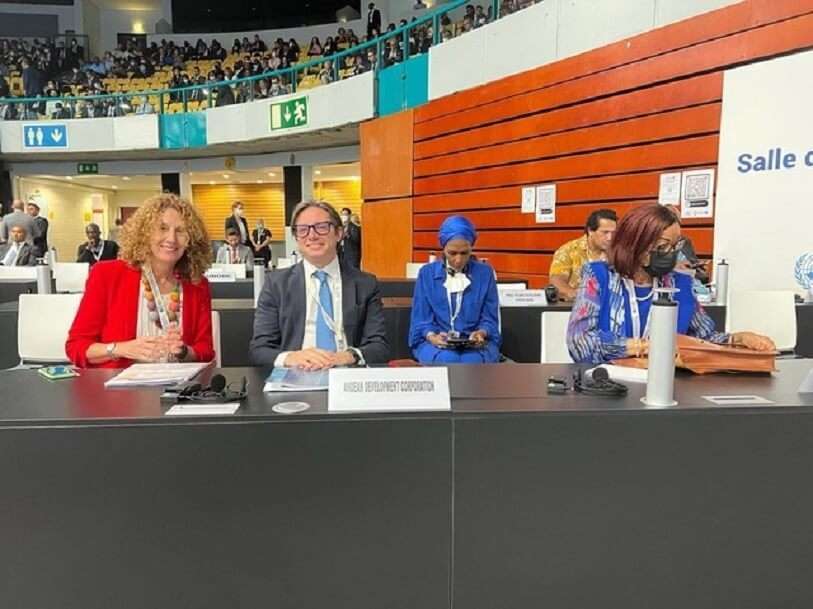CAF will allocate $1.25 billion to protect Latin American and Caribbean oceans

During the Oceans Conference in Lisbon, CAF, the development bank of Latin America, announced that it will allocate 1.25 billion dollars over the next five years to finance projects that contribute to preserving, energising and boosting marine and coastal ecosystems in Latin America and the Caribbean.
The resources will be used to design and implement projects that promote the blue economy, with an emphasis on the restoration of marine and coastal environments, blue carbon, marine renewable energy, sustainable fisheries and aquaculture, integrated coastal management, nature-based solutions, payment for ecosystem services, ecotourism and improved management of marine protected areas, among others.
Today, the oceans face serious sustainability problems, mostly caused and accelerated by climate change, such as increasingly acidic and warmer waters, rising sea levels and overexploitation of marine stocks. In Latin America and the Caribbean, marine ecosystems show a reduction in abundance, density and cover of coral and fish stocks, changes in plankton and loss of vegetated wetlands.
"This funding reaffirms our commitment to lead the fight against climate change and the development of the blue economy in Latin America and the Caribbean. With these resources we will implement innovative solutions that contribute to mitigate the effects of global warming, enhance the preservation of marine ecosystems, and contribute to improving the living conditions of the millions of Latin Americans who depend on the oceans," said Sergio Díaz-Granados, CAF's Executive President.
The resources to protect the oceans are part of CAF's objective to become the green bank of Latin America and the Caribbean. In this sense, during the COP26 in Glasgow, the institution announced a financing of 25 billion dollars in green operations that help increase climate resilience, preserve biodiversity, promote energy transition and achieve low greenhouse gas emissions growth. In parallel, the institution's green financing will increase from 24% in 2020 to 40% in 2026, and all its operations will be aligned with the goals of the Paris Agreement.
One of the first projects within this financing is the agreement for the protection of the Marine Corridor of the Eastern Tropical Pacific (CMAR), a region shared by Colombia, Costa Rica, Ecuador and Panama that generates 3 billion dollars a year, mainly from fishing, tourism and maritime transport. Thanks to a CAF contribution of USD 1 million, joint strategies will be implemented with the participation of the governments of the four countries, civil society, international cooperation agencies and NGOs. The biodiversity of the Marine Corridor, which includes coral areas, the passage of large migrants, reptiles and numerous sharks, is linked to the cultural and tourist offer of customs, gastronomy and handicrafts.

Latin America and the Caribbean contains one of the most important productive marine areas in the world, with a unique biodiversity that represents a significant portion of the world's marine biodiversity, home to the Mesoamerican Barrier Reef System (MBRS), the second largest barrier reef in the world. The region accounts for 18% of global marine ecoregions and has 47 of the world's 258 marine ecoregions.
The effects of climate change on the oceans are evident: more than 80% of the oceans experienced at least one marine heatwave in 2020 (45% had strong heatwaves, while 28% had moderate heatwaves), which is leading to reduced fish stocks and coral die-offs, among other effects. To this must be added the overexploitation of coastal marine resources, including commercial and illegal fishing, unplanned urban development in coastal areas and the dumping of untreated sewage into the sea. The CRFM estimates that in 2019, fish production in the Caribbean declined by 40% from its historic low of ten years ago. For its part, the FAO has ranked Caribbean fish stocks as the most depleted globally, with 55% of commercial fish stocks overexploited or depleted.
The consequences of the poor health of the oceans threaten global food security, the sustainability of the planet and the production and trade systems themselves. It is therefore imperative that we promote new international consensus to build more resilient and diversified economies, generate new jobs and prepare the region for the challenges associated with economic recovery in a context of global warming and weakened coastal and marine ecosystems.
To position the region as a leader in the fight against global warming, CAF is prioritising a sustainability agenda that values initiatives with environmental and climate co-benefits for the development of sectors such as water, energy, infrastructure, transport and digitalisation, among others. In addition, the institution is supporting its member countries to boost the blue economy, promote the energy transition, strengthen the conservation of natural ecosystems and biodiversity, and achieve low greenhouse gas emissions growth.
The institution also plans to strengthen the mobilisation of third-party funding sources, such as through the issuance of bonds and green and climate funds, and will promote strategic alliances to enhance coordinated work between governments, civil society, international organisations, NGOs and the private sector. This will help to conserve biodiversity, design public policies for adaptation and mitigation, strengthen government capacities and encourage environmentally friendly and inclusive economic growth.








